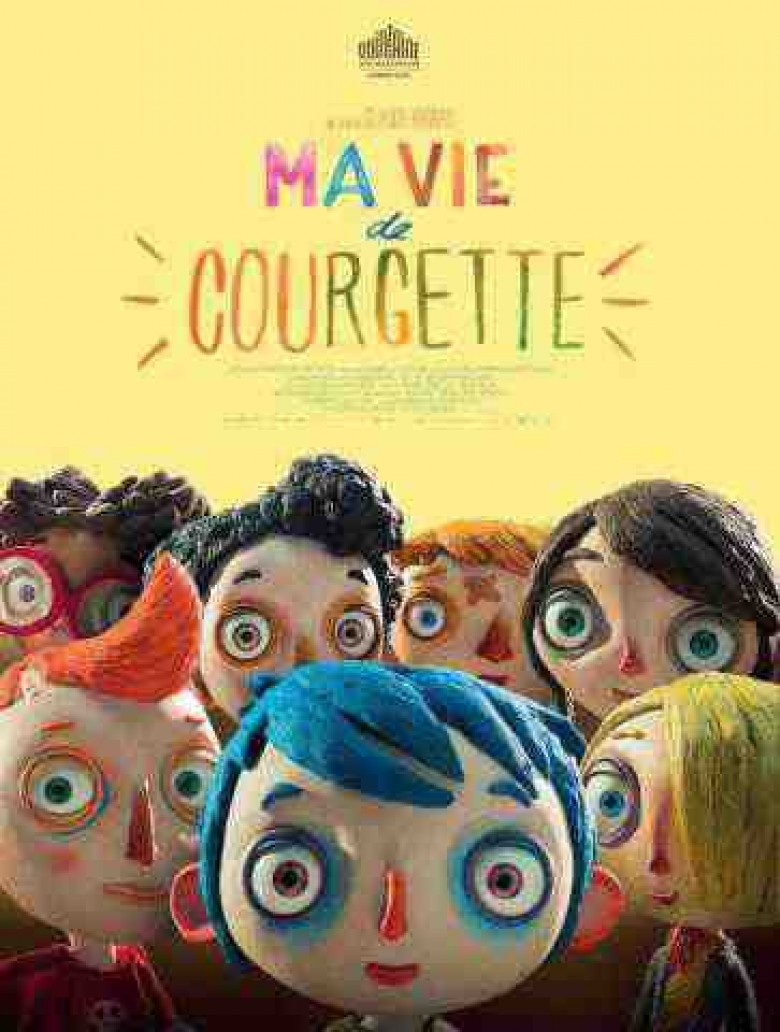"Well, I think I killed my mum”
You have to respect a story targeted towards children that is allowed to possess pathos. Take Gilles Paris‘ 2002 novel Autobiographie d’une courgette for example—a 228-page piece centering on a nine-year old boy’s experience living as an orphan in France after accidentally killing his mother. This is the kind of dark subject matter that many parents wouldn’t let their children go near, and yet it also contains a hopeful strain of optimism and love that those same kids may crave. But even if some readers aren’t allowed access to young “Zucchini’s” (his real name is Icarus) journey because of parental fear, there are orphans experiencing this roller coaster of emotions that need it to understand that they aren’t alone. No matter how dire things seem, love will remain in reach.
So while it may seem odd that director Claude Barras and screenwriter Céline Sciamma would adapt this tale into a colorful stop-motion animated film entitled Ma vie de Courgette [My Life as a Zucchini], it’s not. I’ll admit that an opening prologue of Zucchini (Gaspard Schlatter) drawing on a kite in the attic of his house with beer cans strewn about while his mother drinks and yells at the TV below was jarring. The events that lead to her untimely demise while clouds roll in and lightning strik before showing the boy being scooped up by Raymond the policeman (Michel Vuillermoz) were devastating. Seeing it all brought to life by a blue-haired clay figurine, however, brought me closer to the material. Children endure tragedy just as keenly as adults.
Eventually the medium fades away and you begin to simply watch as Zucchini’s circumstances evolve. This could have easily been adapted into a live action movie, but going that route would have added too much realism. Once you start watching adult actors do despicable things to child actor victims, it becomes too mature for the target audience. The Claymation rounds off some of those corners and may even trick a few lazy parents into letting their kids watch due to the “animation” alone (this is why Sausage Party prominently displayed its R-rating). So while the medium doesn’t really add anything stylistically to the subject matter, it does provide it with a wider net of accessibility. Placing it into the “family outing” conversation this way is extremely important today.
Expect an authentic depiction of adolescence with a healthy side portion of real psychological hardships while watching. We’re shown examples of bullying via Simon (Paulin Jaccoud), the brazen smart aleck, as well as the thawing of enemies into friends with more in common than their defenses will initially let them believe. We’re shown the compassion of adults who take being responsible for a brood of orphans as more than just a job. Madam Papineau (Monica Budde), Mr. Paul (Adrien Barazzone), and Miss Rosy (Véronique Montel) have made this place as much their home as it is the children’s. Beyond being guardians and disciplinarians they, without fail, keep an open ear. They sense the subtext of actions and protect their wards from all dangers, including their own families.
Simon is the result of drug-addicted parents, Ahmed (Raul Ribera) wets the bed, Jujube (Elliot Sanchez) can’t stop eating his sorrows, Alice (Estelle Hennard) is prone to involuntary fits of motion, and Béatrice (Lou Wick) cannot hear an approaching car without running to the door in the hope that it’s her mother. Every one of them is tragic beyond repair and yet they learn that they have each other. Just because the families that should have protected them couldn’t doesn’t mean that this new cobbled together family won’t. It doesn’t mean that their relationship with each other is less important or less pure, either. Love comes in many shapes and sizes. Sometimes these kids merely want to be acknowledged; they hope they won’t simply fade away.
The orphanage’s inner-workings are pretty much the extent of the main plot. How Zucchini adjusts and helps his new friends open up from the darkness of their memories is the true impetus for the project. The way this manifests is through yet another newcomer: Camille (Sixtine Murat). Her past is the most horrible of all—if you could honestly judge them on a subjective scale—and yet she seems childlike and happy even though her eyes betray her. A relative is willing to take her in to receive the government assistance doing so provides, so she needs saving by the end. The kids rally behind her and show they haven’t disappeared yet. Life will always be difficult, but they have each other to help them survive.
How things turn out is hardly surprising (although I believe some details in the book have been changed, the themes or emotions remain true), but this type of story is better off for it. Paris’ intent wasn’t to provide children with a cautionary tale of despair upon despair; he seeks to show it is possible to escape that despair. For all the nightmarish scenarios presented, Camille’s aunt is the only bona fide villain. Everyone else is the epitome of concerned citizen and empathetic protector. Think Short Term 12 for ten year olds and you can begin to understand the delicate balance between present depression and future hope that is shown. In the end, My Life as a Zucchini‘s success rests on reminding kids that they aren’t to blame. Things will turn around.
Note: Stay for the credits to see a fun animated look at Paulin Jaccoud’s screen test and a request he makes should he receive the role.
Score: 7/10 | ★ ★ ★
Rating: NR | Runtime: 70 minutes | Release Date: October 19th, 2016 (France)
Studio: Gébéka Films / GKIDS
Director(s): Claude Barras
Writer(s): Céline Sciamma / Gilles Paris (novel Autobiographie d’une courgette)

